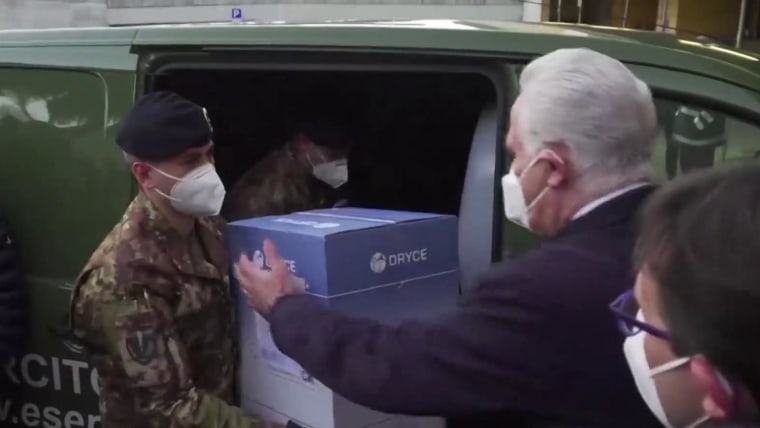LONDON — A spat between the United Kingdom and the European Union over the export of Covid-19 vaccines could jeopardize not only current inoculation campaigns, but also undermine the fight against new variants, experts warn.
On Wednesday, the European Commission said “reciprocity” would be among the new criteria it would consider before authorizing exports of vaccines outside the 27-nation bloc. The E.U. vaccination campaign lags behind other countries, including the U.K., as Covid-19 cases rise on the continent.
Talk of an export ban last week brought pleas for cooperation from Britain, which is partly reliant on vaccine supplies from Europe.
E.U. Health Commissioner Stella Kyriakides stressed the new rules were not an export ban — but experts warn that international tensions such as these could have serious side effects. The European Commission and the U.K. issued a brief statement Wednesday night to say they were in talks on vaccine plans and E.U. heads of state will discuss this in a virtual summit Thursday.
“If trade restrictions and other supply-side bottlenecks prevent universal coverage, then this would indeed make us all less safe,” said Rob Yates, director of the global health program at the Chatham House think tank in London.
“With new variants coming along which may require a new booster vaccine, we may need to ensure universal coverage of these new vaccines on an annual basis.”
Since the beginning of the pandemic, health experts have stressed that no one is safe until there is global access to vaccinations. And the longer the virus circulates, the more chance there is for new, more infectious or deadly variants to develop.
Export bans and conflict over vaccine distribution could only hinder these efforts.
“There is a connection with the vaccine coverage, because if you delay vaccine coverage, in time you create more opportunities for replication in large communities and emerging strains and variants,” said Dr. Antoine Flahault, director of the Institute of Global Health at the University of Geneva.
Download the NBC News app for the latest news on the coronavirus
Europe is now facing a third wave of the virus along with new lockdowns in several countries. On Wednesday, Kyriakides said that the bloc has seen an increase in the spread of variants, including the South African variant, which has been identified in 18 countries.
Just more than 10 percent of adults in the E.U. have received their first shot, compared to more than 50 percent of adults in the U.K. and 32 percent of adults in the United States.
President Joe Biden has said that there will be enough doses in the U.S. for every adult by the end of May, and the U.K. hopes to be able to offer all adults shots by the end of July. The E.U.’s target is to vaccinate 70 percent of adults by the end of the summer.
The U.S. and the U.K. are not known to have exported any vaccines. At the same time, manufacturers based in the E.U. have exported at least 41 million doses to 33 countries since the beginning of February, European Commission President Ursula von der Leyen said last week.
Last week, the White House announced a plan for the first U.S. exports: 4 million doses of the AstraZeneca Covid-19 vaccine to Canada and Mexico. The vaccine is not yet approved for use in the U.S.
The U.S. has also said that it would donate up to $4 billion to the humanitarian program COVAX, which aims to fairly distribute vaccines between rich countries and the developing world. However, critics have said that these countries need the vaccines more than the money.
And any slowdown in the distribution of vaccines because of trade barriers could exacerbate the situation.
“Trade restrictions, to the extent that they actually impede a proper and orderly rollout of the vaccine internationally, could actually indirectly create more problems down the line by creating more variants that we don’t know how to deal with,” said Flavio Toxvaerd, an economic epidemiologist at the University of Cambridge.
According to Matt Linley, a senior analyst with Airfinity, a science analytics company, the supply of vaccines in the U.S. could also come under pressure if the E.U. enacts trade restrictions.
“There is the potential that countries start putting pressure on the U.S. to start releasing Pfizer doses and Moderna doses if they are not coming out of Europe,” he said.
For the moment, U.K. politicians this week stressed the need for international cooperation on vaccines, in what looked to be an effort to avoid an escalation of tensions with the E.U. But these trade pressures are likely to stick around for the foreseeable future, according to Yates of Chatham House.
“It’s not going to go away, particularly if we are looking at needing booster vaccines and new vaccines coming along,” he said. “This really could develop into a major issue for global health going forward.”
Source: | This article originally belongs to Nbcnews.com











